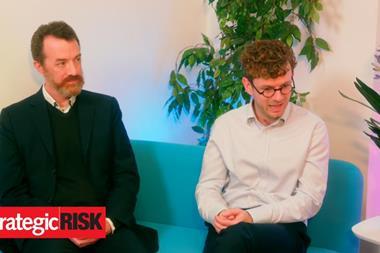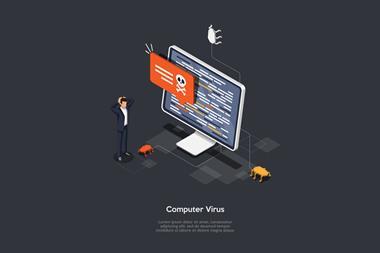Geopolitics is at the top of every board agenda, but how is the landscape changing and what can risk managers do about the escalating threats? Christopher Coppock, head of geopolitical and economic risk analysis for credit specialties, Marsh UK explores

Geopolitics has shot up the boardroom agenda, as organisations grapple with an increasingly complex and fragmented landscape. No longer the domain of specialists or confined to select emerging markets, today, political risk is shaping corporate strategy, investment decisions, and supply chain planning across industries and geographies.
As Marsh’s latest political risk report outlines, the uncertainty we’re facing isn’t just widespread — it’s structural, persistent, and deeply embedded in business-critical issues.

Christopher Coppock, head of geopolitical and economic risk analysis for credit specialties, Marsh UK explained: “In previous years, we were trying to draw attention to geopolitical risk themes that maybe weren’t being as widely discussed as we felt they should be.
“This year is different. Everyone is already focused on geopolitics. It’s top of every conference agenda and every board meeting. So instead, we’ve structured our approach around three central questions: what are the big structural shifts underway, what do they mean for organisations, and what can you realistically do about them?”
The fragmentation of tradition trade models
One of the key trends reshaping political risk is the transformation of global trade. The ‘connector model’ — where countries such as Vietnam, Mexico and Hungary serve as intermediary nodes between China and the West — has allowed international trade volumes to remain high despite growing protectionism. However, this architecture may not be sustainable.
“A question that you probably ought to be asking yourself is whether this connector model is going to exist in five years’ time? Or are policymakers actually going to enforce a greater fragmentation of the system that leads to a reduction in global trade?” said Coppock.
“That nuance is really important when making risk decisions.”
“One of the more helpful things we’ve found is to stop reacting to every individual policy announcement out of Washington or Beijing, and instead bucket them into underlying objectives. When you do that, you can begin to assess how likely a policy is to be enacted, how long it might last, and what impact it could realistically have.
“For example, if a tariff is about generating revenue, it’s probably going to be permanent. If it’s about winning a concession from another country, it might be more temporary. That nuance is really important when making risk decisions.”
For CROs, the implication is clear: even businesses that feel distanced from global politics are exposed. Complex supply chains and long-term investment cycles are increasingly vulnerable to policy decisions shaped by domestic political decisions.
The new unpredictability of political power
To make matters worse, the international political structure itself is evolving, meaning that political decisions are both harder to predict and more potentially disruptive.
The erosion of institutional guardrails means that organisations must plan for a much wider set of potential outcomes, including in jurisdictions previously considered to be stable. Ultimately, the assumptions that once underpinned strategic choices must now be revisited - with greater attention paid to the individual political actors driving policy.
“Scenario planning ought to be updated to reflect this reality.”
“Some of the assumptions we’ve been relying on for decades — about stable alliances, consistent trade policy, or predictable regulatory regimes — may no longer apply. The risk isn’t always that something will go wrong, but that it could. And if you haven’t even considered that possibility, you’re going to be unprepared when it happens” said Coppock.
“In the current environment, what is viewed as rational at a country level may not be the action that the governments are taking, because individual political leaders are facing less constraints and therefore more likely to act in ways that they perceive to benefit them. Scenario planning ought to be updated to reflect this reality.”
Putting structure around uncertainty
To battle this unpredictable reality risk leaders must balance strategic foresight with practical tools. While not all uncertainty can be eliminated, organisations can reduce exposure by integrating more behavioural insights into traditional risk modelling and paying closer attention to ‘black swan’ scenarios that would have seemed implausible a few years ago.
Alongside scenario planning, insurance plays a growing role in mitigating uncertainty. Products like trade credit insurance and political risk insurance are becoming essential tools, especially in sectors with cross-border exposure.
“You’re never going to be able to completely solve for a good chunk of the uncertainty. And that’s where some of the insurance solutions become valuable,” Coppock said.
“One thing that we’re encouraging organisations to do is go back and revisit the geopolitical assumptions that they might be implicitly making and have been relying upon”
Ultimately, Marsh urges organisations to adopt a “geopolitics-first mindset”. In an era of shifting global rules and expanding uncertainty, even small steps can set firms apart. At the core of that mindset is a simple exercise: challenge your assumptions.
Coppock concluded: “If you can get to a point where your structure gives you more confidence than other organisations in your sector, that represents an opportunity to take advantage of uncertainty and serves as a differentiator.”
“One thing that we’re encouraging organisations to do is go back and revisit the geopolitical assumptions that they might be implicitly making and have been relying upon. Ask yourself: ‘In the context of a changing world, are we confident that those assumptions still hold? Do we feel like we’ve got the right strategy in place to manage whatever the resulting risk could be?”













